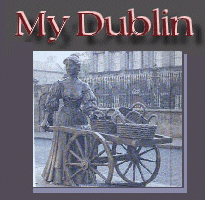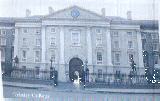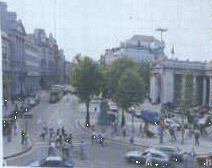


"What's the best part of that drawing?", I asked her. She pointed to
the circle.
"And why is it the best part?". She looked at me with a slight frown
on her face, and said nothing.
"Why did you write that?", I persisted.
She gave me a shy smile.
"Cos it's de troot, sir", she said.
As I handed her a few pence, I struggled to keep the tears from my eyes. A grown
man shouldn't cry in front of a nine year old!
As I walked up Grafton Street, I thought of the great preachers: the Billy Grahams and John Wesleys, the Wycliffes and, dare I say it, the C.H.Spurgeons, and all the great and profound truths they had spoken in their dissertations, and I wondered if they had ever preached a sermon like this little girl, scribbling in the dust on a hot Friday afternoon?
This is the Dublin, I know. A place full of surprises and an amalgam of diverse cultures.
The Nouveau Riche still mingling with the slum-dwellers, the new wealth of
an emerging European society, rubbing off on the poor, who are no longer so
lacking in means, due to a reasonable welfare state, and a moderately thriving
economy. 
It is a city of contrasts where the ancient cultures are not forgotten, but the new cultures of a film industry, the music business, both classical and "rock", seem to impinge on the lives of everybody. In common with the state of affairs in many European cities, the pride of place and position in the hierarchy of the State and Country are more and more important. Thus it is not unusual for the business man to be seen at a "rock" concert, and the local street lout to turn up unexpectedly at the National concert hall, because their uncle or sister happens to be in the Number One Army Band.
Strange, also is the conglomeration of buildings within the city. The ancient edifice of Trinity College, where once the Roman Catholic was barred from attendance, contrasts with modern buildings such as the Central Bank, or the Government buildings on the side of the River, hideous in it's extreme angularity.
Unlike the Capital of Northern Ireland, the Protestant minority, here in Dublin, mingles successfully with the Catholic people. Surely we have our different ways of looking at life, but we agree to differ, and sometimes agree to agree on at least the small matters of doctrine and belief. The number of "prayer groups" among the Catholic inhabitants is growing at an energetic rate, and the once predominant "Anglican" Church of Ireland is dwindling in numbers, as times change and the population emigrates to Australia, and the U.S. The dull and over respectable routine of a formal religion gives way to the more exciting and vibrant atmosphere of the Charismatic movement, or even the Toronto Blessing!
We also have our down side, of course. The ever increasing drugs problem, inevitably leads to crime growing at an alarming rate. The once quiet suburban streets are alive with the muggers and handbag snatchers of the modern metropolis. Car theft is rampant, and even the murder rate is rising. At times the situation is likened to that of New York, or the Chicago of the early twentieth century, but we live with it and it impinges only on a small minority, who are unfortunate enough to fall victim of the ravages of petty, and not so petty crime.
 These are the streets which echoed to the steps of Oliver Goldsmith and Oscar
Wilde. Their ghosts still haunt the pavements and side-walks, but I sometimes
think that they themselves must be haunted by the new Dublin with its trendy
night-clubs and Parisian-like cafes. They would recognise indeed the feeling
that as ever the politics of the day are merely an aspect of a newly invented
sport, but would be amazed at the serious way in which some of the National
sports are treated as the most profound matter since the invention of the wheel!
These are the streets which echoed to the steps of Oliver Goldsmith and Oscar
Wilde. Their ghosts still haunt the pavements and side-walks, but I sometimes
think that they themselves must be haunted by the new Dublin with its trendy
night-clubs and Parisian-like cafes. They would recognise indeed the feeling
that as ever the politics of the day are merely an aspect of a newly invented
sport, but would be amazed at the serious way in which some of the National
sports are treated as the most profound matter since the invention of the wheel!
It is, therefore, a topsy turvy city, this Dublin of mine, where the friendly "how's it goin'" from all comers is accepted in much the same way as the ancient "God save all here!" was in the dim and distant past. Walk down any city street, and you will hear the raucous music of the latest hit exploding from the doors of the department stores, in order to lure the innocent passer by within it's comfortable walls. Around the next corner the itinerant beggar will sing an old ballad he heard from his Grandfather, with all the enthusiasm of a winner of the National Lottery.
Up the street from him a dance troop will swirl and twirl to the tune of a Hungarian rhapsody, and the poet, or the reader of poetry, since dead from an overdose of something, because he has just discovered he has AIDS, will fight to be heard above the sound of students from the school of music, who are playing Mozart's final movement from "Ein Kleine Nacht Musik", for the one hundred and eleventh time. Cars, trucks and people add to the general cacophony, the traffic, indeed, becoming as congested as London, England, where the orbital motorway is sometimes referred to as the largest car park in Europe.
Smells from the river mix with the aromas from the bakery or the distinct smell of hops and barley brewing in the Guinness factory down the river, and the splendid coffee smells exuding from the famous Bewley's Cafe.
I shall get away from it, I think, and walk a few miles from the hub of
the town, to where the lazy canal carries it's peace and mellow waters into my
soul, or meander up Grafton Street to St. Stephen's Green, where the office
workers will congregate during the lunch break, and feed the ducks on the
tranquil pond. Soon, I shall have to return to the rat-race, but not now, not
while I can merge with the beauty of nature and the stillness of a warm Spring
day. 
"Dear dirty Dublin", they called it once, and it still is...dear lovely rowdy, sometimes refined and, yes, still dirty, but I wouldn't leave it for all the whole wide world...
would I?
© David Spurgeon 1996